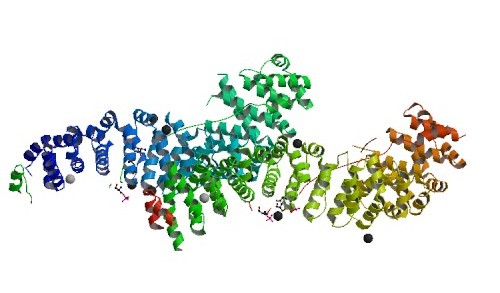
The structure of the E-cadherin protein chain bends and turns. The normal function of E-cadherin is to allow cells and tissues to adhere to one another in a normal fashion.
The CDH1 gene, located on chromosome 16, normally encodes for a protein called E-cadherin. The normal function of E-cadherin is to allow cells and tissues to adhere to one another.
When there is a mutation in the CDH1 gene, the function of the E-cadherin protein is disrupted, and cancer often results. The exact mechanism by which the CDH1 gene mutation ultimately causes gastric cancer is not entirely known.
Inheritance of the CDH1 gene mutation follows an autosomal dominant pattern, meaning that offspring of mutation carriers have a 50% chance of inheriting the mutant gene. It is estimated that up to three out of every four CDH1 gene mutation carriers will go on to develop gastric cancer.
It is important to note, however, that not all HDGC families have a mutation in the CDH1 gene. Other genes including CTNNA1 that lead to HDGC (Hereditary Diffuse Gastric Cancer) and are currently being studied.
Learn more about HDGC Learn about HDGC in families Learn about the CDH1 Gene
Genetic Testing
Families with a history of stomach cancer may qualify for diagnostic or predictive testing. Learn more on HDGC in families and the criteria for genetic testing. Read about DNA banking and why it’s important.
What is Cascade Testing?
A systematic process for the identification of individuals at risk for a hereditary condition. The process begins with the identification of an individual with the condition and/or a pathogenic variant associated with the condition and then extending genetic testing to his/her at-risk biologic relatives. This process is repeated as more affected individuals or pathogenic variant carriers are identified. This process is sometimes referred to as cascade testing (preferred term). “NCI Dictionary of Genetics Terms.” National Cancer Institute, 4 Dec. 2020, www.cancer.gov/publications/dictionaries/genetics-dictionary/def/cascade-screening.
Find a Genetic Counselor
No Stomach For Cancer is pleased to partner with Emory University to raise awareness about stomach cancer and expedite access to personalized genetic care — including genetic testing for hereditary cancer syndromes associated with gastric cancer. Through this partnership, individuals can sign up for safe and secure telemedicine appointments to:
Meet with a genetic counselor to discuss their personal and/or family history of gastric cancer
Learn about the potential risks for themselves and their families — up to 10% of stomach cancer cases are “familial” in origin, meaning that other family members are affected or have an increased risk.
Explore genetic testing options
Get help creating a care plan to share with health providers to increase the chance of detecting cancer early or, in some cases, review risk-reduction options